Jo Ann Jenkins is the CEO of AARP, the world's largest nonprofit, nonpartisan membership organization. AARP is focused on helping people "improve their quality of life" as they age; it has more than 38 million members.
Jenkins joined AARP in 2010 and became CEO in 2014. Previously she was chief operating officer at the Library of Congress, one of her many roles in public service. She is the author of "Disrupt Aging: A Bold New Path to Living Your Best Life at Every Age," a book about changing society's views on aging. She is the first woman to be named CEO of AARP on a permanent basis.
Answers are edited for length and clarity.
Q: AARP focuses on people over 50, what a massive slice of the population.
A: It is a huge population, over 110 million people over the age of 50 in the U.S. alone.
We call this the longevity economy, meaning that people over the age of 50 are actually contributing more than $7.6 trillion dollars in annual economic activity. In fact, if this cohort were a country — based on its economic value — it would be number three behind the US and China. People over the age of 50 do spend an awful lot and contribute a lot to the economy: 51 cents of every dollar spent by someone in the US is spent by the person over the age of 50.
Q: And that money, what are they spending it on?
A: They usually are spending it on the same kind of things as millennials: home, entertainment and health care. I would put those three things at the top of their list.
Q: Something you talk about in your book is challenging outdated beliefs about retirement and aging. What do you see as some of the most common misconceptions?
A: A generation ago, middle age was 40. Certainly middle age has moved up to the 50s and 60s. Think about it — a 10-year-old child today has a 50% chance of living to be 104.
So if you look at the 100 year lifespan, how do we start changing that perception of aging? How do we think about life if in fact 50% of us may soon be living to be 100? How do we rethink adolescence? How do we rethink work? Do we really have to stay in one place for 30 years like our parents did? Or are we going to have three and four totally different careers over the course of a lifetime?
So the book is about shattering those outdated beliefs and stereotypes — even the idea that everybody wants to retire at 62.
I think what we're seeing is that in fact, close to 40 percent of our members say they want to continue working past traditional retirement age — either because they want to or because they need to. And we know that people who continue to work or even volunteer can live longer than people who don't.
So all those misperceptions of what people want when they retire or what they want to do in their older life I think is being totally torn apart by the idea that people are going to live longer, healthier — and hopefully in better financial shape — than they had in the past.
Q: Speaking of financial shape, retirement savings — or the lack of — is a huge concern. What do you see as a priority to help ensure that everyone doesn't spend their old age in poverty?
A: Well that's exactly why we hope that people are saving their own money, that hopefully they have a pension or 401(k) at their place of work and that they're not solely dependent on Social Security because we think you have to have all three of those.
And right now we are in the middle of this huge fight to bring down the cost of prescription drugs. We know the older you get, the more prescription drugs you take. And the fact is that some people are spending 30%, 40% of their retirement income on the cost of prescription drugs that they depend on. It's one of those things that really cuts back on their financial security.
Also, when Social Security was put in place, people were retiring earlier and living shorter lives. It's all the more reason we need to address these issues of Social Security solvency and also adequacy so that it's here for not just our generation but generations to come.
Q: What drew you to this job? You've got plenty of background in D.C. but what drew you to this niche?
A: I've always worked in jobs that are focused on giving back and helping others, whether it's in government service or in the private sector. And AARP had asked me if I would come to head up their charitable arm, which focuses on low income and vulnerable individuals. After two years I was asked to come to AARP the parent to be the chief operating officer and then 18 months later to be the CEO.
So when I came to AARP, my intention was to be running the foundation for a long, long time. But you know I'm here in the CEO position and I love the work that AARP is doing. And I tell the staff all the time that I get excited to come to work every day knowing the impact we can have. Not many people get to work in a job that they love and so I find myself fortunate to be in this position.
My message is really how do we start looking at aging in a positive way? For many of us it's our own perception of aging that is the bigger problem than societal reflection of it.
I know for me, I'm living at 61 very different than my parents lived when they were 61. And we are all still in the workplace and we're all being very productive and I think that what's important is that this age cohort is living very differently and contributing to society and is not just being a burden in terms of their cost, but they really are the backbone of the economic activity in the U.S.
UNITED NATIONS (AP) — The United States vetoed a widely backed U.N. resolution Thursday that would have paved the way for full United Nations membership for Palestine, a goal the Palestinians have long sought and Israel has worked to prevent.
The vote in the 15-member Security Council was 12 in favor, the United States opposed and two abstentions, from the United Kingdom and Switzerland. U.S. allies France, Japan and South Korea supported the resolution.
The strong support the Palestinians received reflects not only the growing number of countries recognizing their statehood but almost certainly the global support for Palestinians facing a humanitarian crisis caused by the war in Gaza, now in its seventh month.
The resolution would have recommended that the 193-member U.N. General Assembly, where there are no vetoes, approve Palestine becoming the 194th member of the United Nations. Some 140 countries have already recognized Palestine, so its admission would have been approved, likely by a much higher number of countries.
U.S. deputy ambassador Robert Wood told the Security Council that the veto “does not reflect opposition to Palestinian statehood but instead is an acknowledgment that it will only come from direct negotiations between the parties."
The United States has “been very clear consistently that premature actions in New York — even with the best intentions — will not achieve statehood for the Palestinian people,” deputy State Department spokesman Vedant Patel said.
His voice breaking at times, Palestinian U.N. Ambassador Riyad Mansour told the council after the vote: “The fact that this resolution did not pass will not break our will and it will not defeat our determination.”
“We will not stop in our effort,” he said. “The state of Palestine is inevitable. It is real. Perhaps they see it as far away, but we see it as near.”
This is the second Palestinian attempt for full membership and comes as the war in Gaza has put the more than 75-year-old Israeli-Palestinian conflict at center stage.
Palestinian President Mahmoud Abbas first delivered the Palestinian Authority’s application for U.N. membership in 2011. It failed because the Palestinians didn’t get the required minimum support of nine of the Security Council’s 15 members.
They went to the General Assembly and succeeded by more than a two-thirds majority in having their status raised from a U.N. observer to a non-member observer state in 2012. That opened the door for the Palestinian territories to join U.N. and other international organizations, including the International Criminal Court.
Algerian U.N. Ambassador Amar Bendjama, the Arab representative on the council who introduced the resolution, called Palestine’s admission “a critical step toward rectifying a longstanding injustice" and said that “peace will come from Palestine’s inclusion, not from its exclusion.”
In explaining the U.S. veto, Wood said there are “unresolved questions” on whether Palestine meets the criteria to be considered a state. He pointed to Hamas still exerting power and influence in the Gaza Strip, which is a key part of the state envisioned by the Palestinians.
Wood stressed that the U.S. commitment to a two-state solution, where Israel and Palestine live side-by-side in peace, is the only path for security for both sides and for Israel to establish relations with all its Arab neighbors, including Saudi Arabia.
“The United States is committed to intensifying its engagement with the Palestinians and the rest of the region, not only to address the current crisis in Gaza, but to advance a political settlement that will create a path to Palestinian statehood and membership in the United Nations,” he said.
Mansour, the Palestinian U.N. ambassador, reiterated the commitment to a two-state solution but asserted that Israel believes Palestine "is a permanent strategic threat."
"Israel will do its best to block the sovereignty of a Palestinian state and to make sure that the Palestinian people are exiled away from their homeland or remain under its occupation forever,” he said.
He demanded of the council and diplomats crowded in the chamber: “What will the international community do? What will you do?”
Israeli-Palestinian negotiations have been stalled for years, and Israel’s right-wing government is dominated by hard-liners who oppose Palestinian statehood.
Israeli U.N. Ambassador Gilad Erdan called the resolution “disconnected to the reality on the ground” and warned that it “will cause only destruction for years to come and harm any chance for future dialogue.”
Six months after the Oct. 7 attack by the Hamas militant group, which controlled Gaza, and the killing of 1,200 people in “the most brutal massacre of Jews since the Holocaust,” he accused the Security Council of seeking “to reward the perpetrators of these atrocities with statehood.”
Israel’s military offensive in response has killed over 32,000 Palestinians, according to Gaza’s health ministry, and destroyed much of the territory, which speaker after speaker denounced Thursday.
After the vote, Erdan thanked the United States and particularly President Joe Biden “for standing up for truth and morality in the face of hypocrisy and politics.”
He called the Palestinian Authority — which controls the West Bank and the U.S. wants to see take over Gaza where Hamas still has sway — “a terror supporting entity.”
The Israeli U.N. ambassador referred to the requirements for U.N. membership – accepting the obligations in the U.N. Charter and being a “peace-loving” state.
“How can you say seriously that the Palestinians are peace loving? How?” Erdan asked. “The Palestinians are paying terrorists, paying them to slaughter us. None of their leaders condemns terrorism, nor the Oct. 7 massacre. They call Hamas their brothers.”
Despite the Palestinian failure to meet the criteria for U.N. membership, Erdan said most council members supported it.
“It’s very sad because your vote will only embolden Palestinian rejectionism every more and make peace almost impossible,” he said.

Algeria's Permanent Ambassador to the United Nations Amar Bendjama speaks during a Security Council meeting at United Nations headquarters, Thursday, April 18, 2024. (AP Photo/Yuki Iwamura)
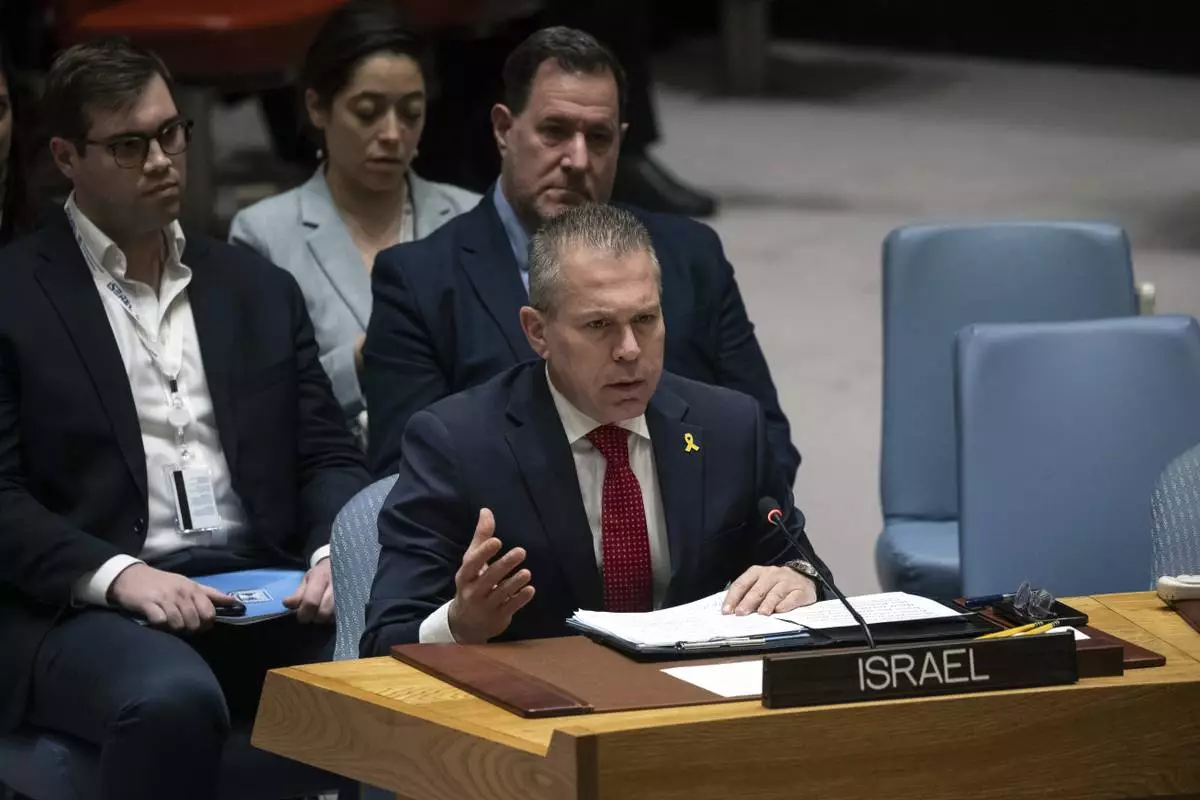
Israeli Ambassador to the United Nations Gilad Erdan speaks during a Security Council meeting at United Nations headquarters, Thursday, April 18, 2024. (AP Photo/Yuki Iwamura)
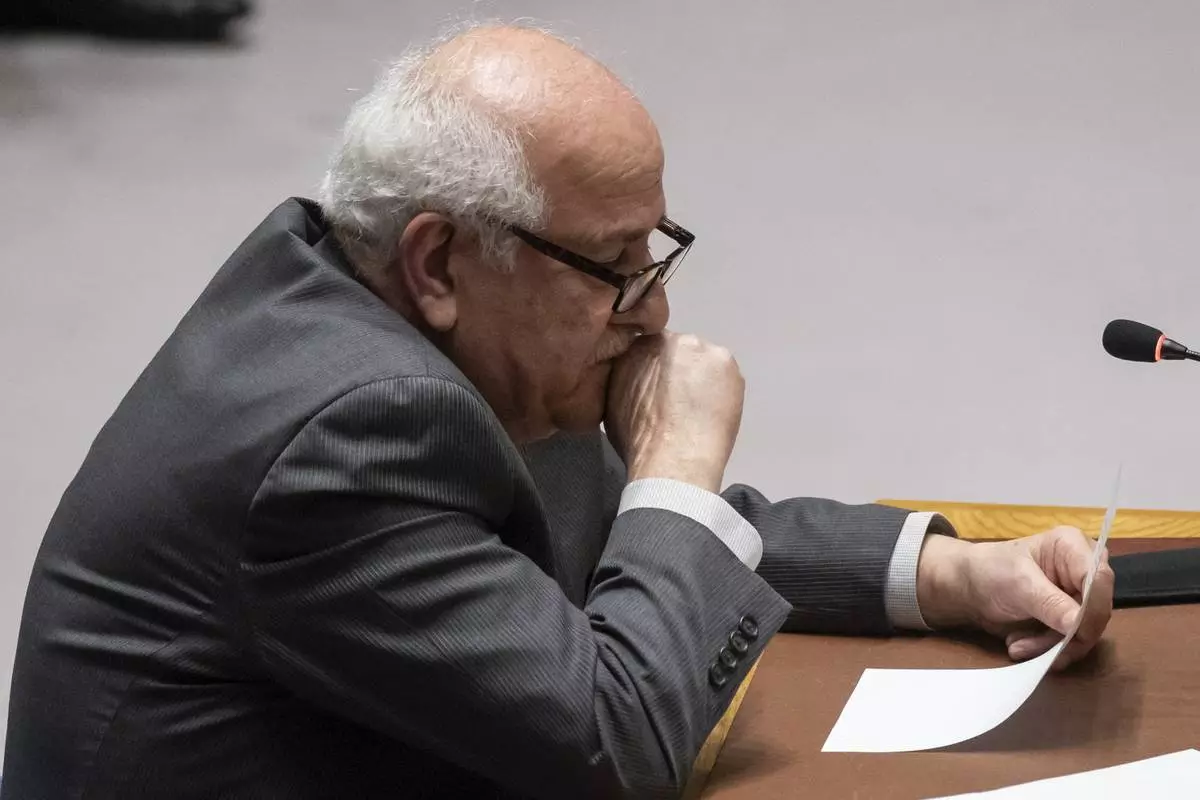
Palestinian Ambassador to the United Nations Riyad Mansour holds tears while speaking during a Security Council meeting at United Nations headquarters, Thursday, April 18, 2024. (AP Photo/Yuki Iwamura)
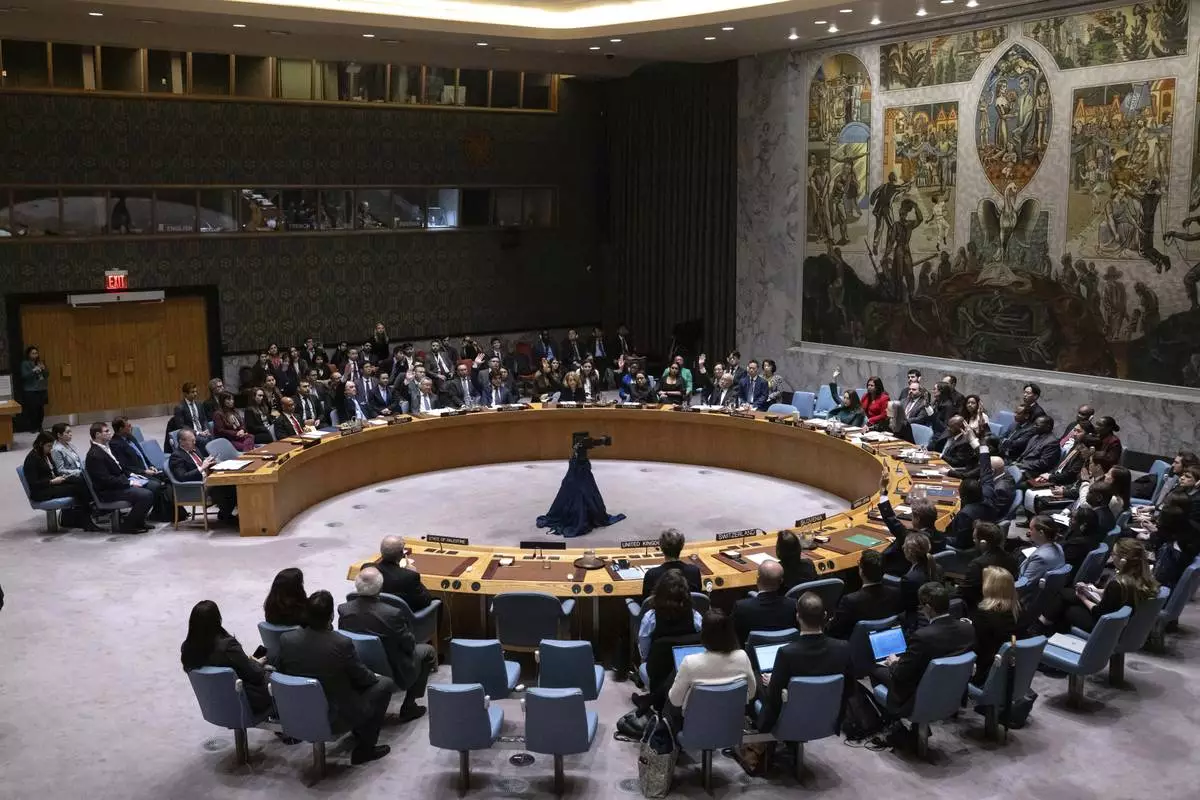
Representatives of member countries take votes during a Security Council meeting at United Nations headquarters, Thursday, April 18, 2024. (AP Photo/Yuki Iwamura)
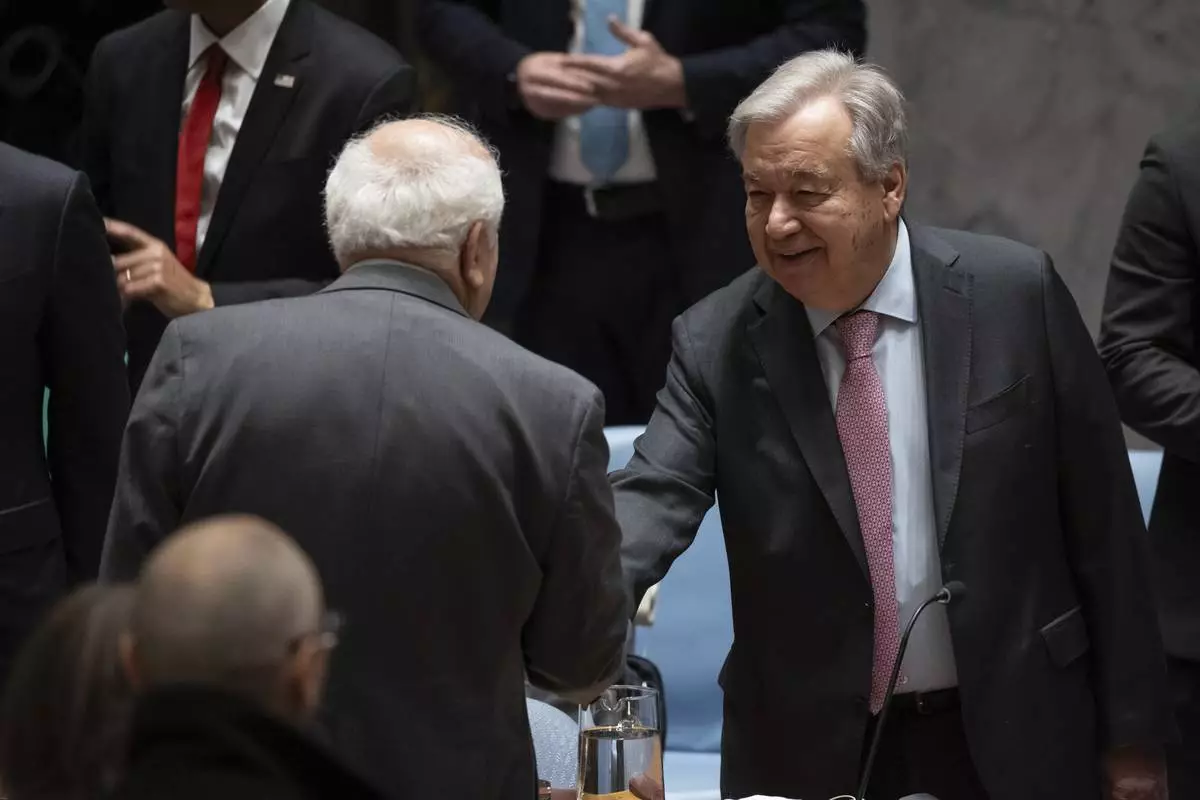
Palestinian Ambassador to the United Nations Riyad Mansour, left, and United Nations Secretary-General Antonio Guterres speak before a Security Council meeting at the United Nations headquarters, Thursday, April 18, 2024. (AP Photo/Yuki Iwamura)
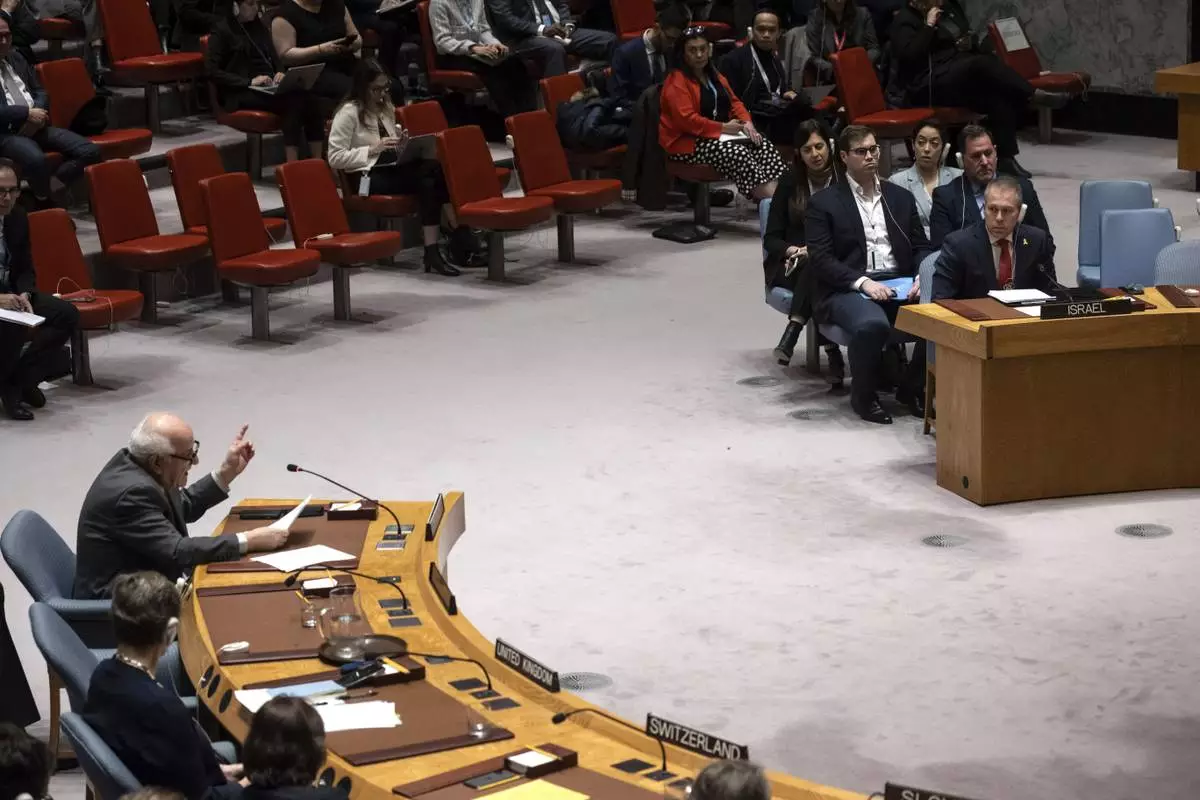
Palestinian Ambassador to the United Nations Riyad Mansour speaks during a Security Council meeting at United Nations headquarters, Thursday, April 18, 2024. (AP Photo/Yuki Iwamura)
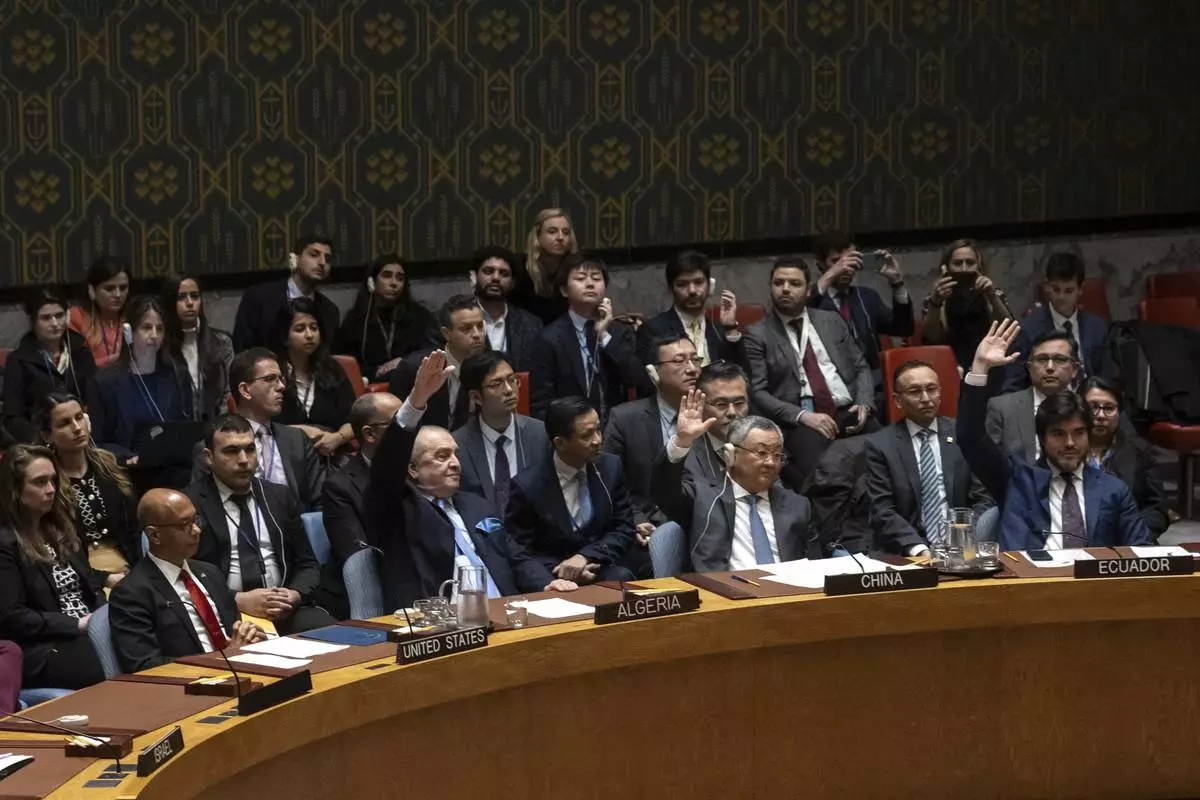
Representatives of member countries take votes during a Security Council meeting at United Nations headquarters, Thursday, April 18, 2024. (AP Photo/Yuki Iwamura)
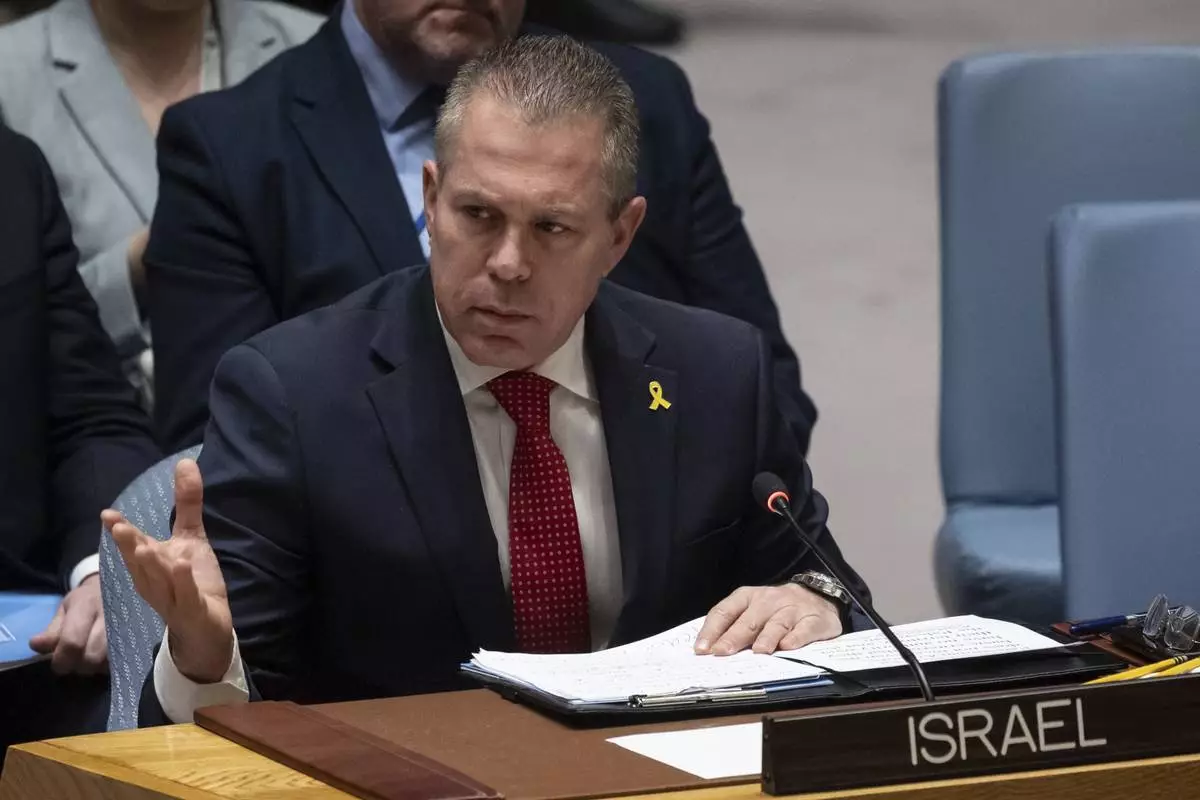
Israeli Ambassador to the United Nations Gilad Erdan speaks during a Security Council meeting at United Nations headquarters, Thursday, April 18, 2024. (AP Photo/Yuki Iwamura)
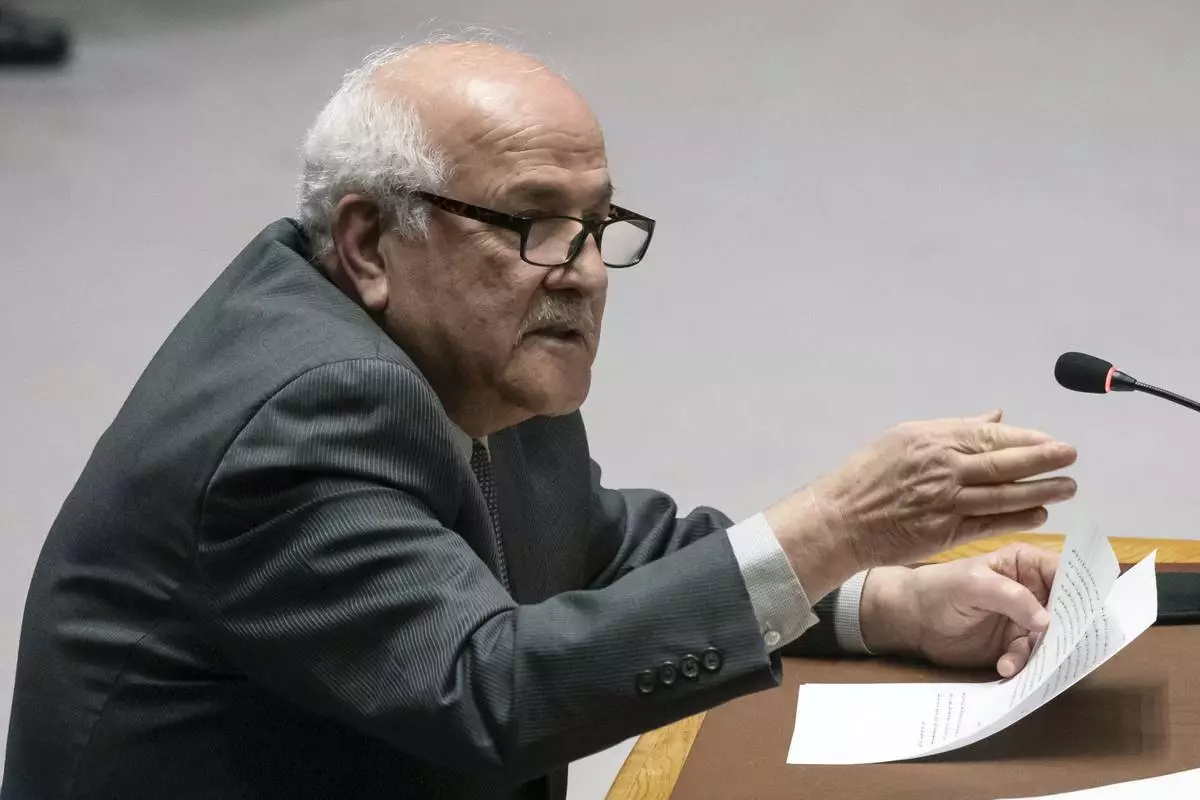
Palestinian Ambassador to the United Nations Riyad Mansour speaks during a Security Council meeting at United Nations headquarters, Thursday, April 18, 2024. (AP Photo/Yuki Iwamura)
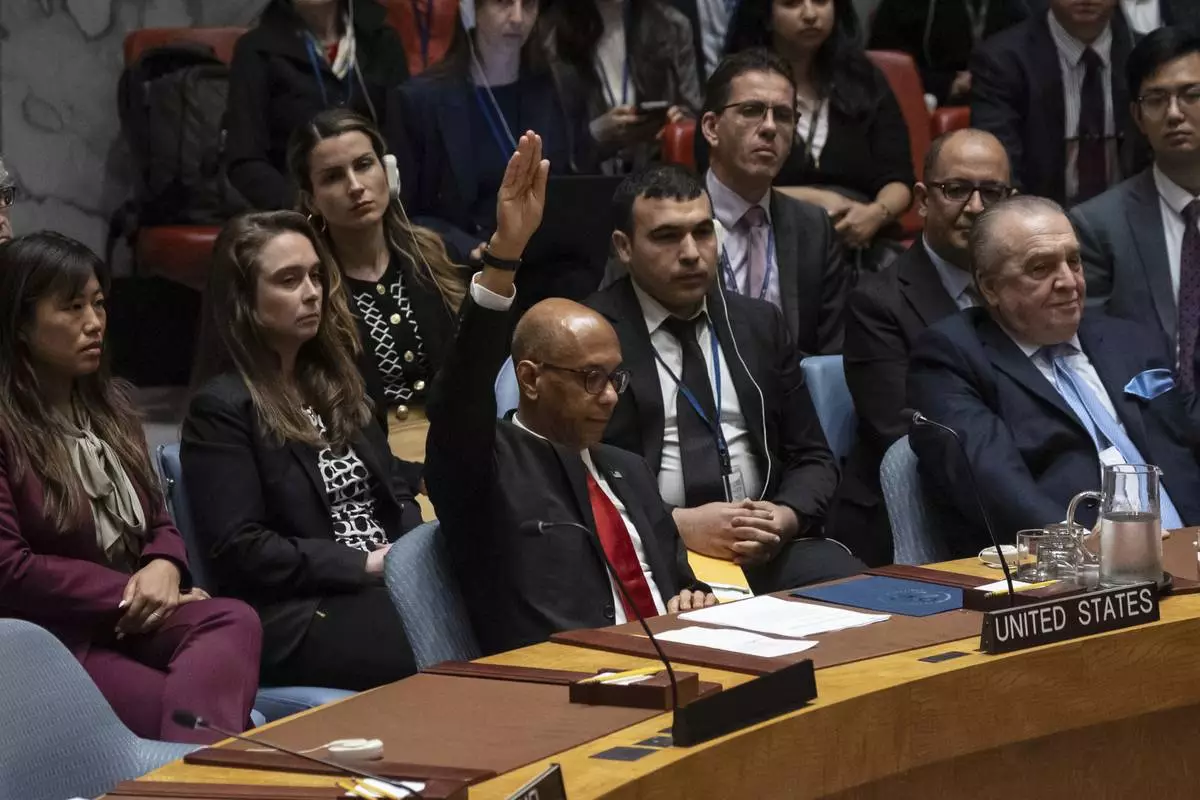
U.S. Deputy Ambassador Robert Wood votes against resolution during a Security Council meeting at United Nations headquarters, Thursday, April 18, 2024. (AP Photo/Yuki Iwamura)



















